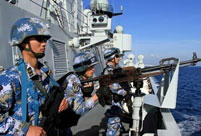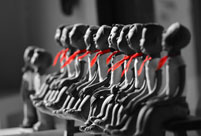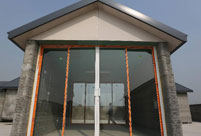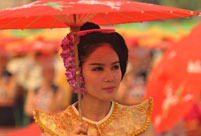 Cherry blossoms reach peak bloom in Washington D.C.
Cherry blossoms reach peak bloom in Washington D.C.
 Top Chinese fashion icons in foreigners' eyes
Top Chinese fashion icons in foreigners' eyes
 Asia's largest business aviation exhibition to be held in Shanghai
Asia's largest business aviation exhibition to be held in Shanghai
 World's top-rated luxury hotels
World's top-rated luxury hotels
 Wu Jing, Xie Nan to hold wedding on May
Wu Jing, Xie Nan to hold wedding on May
 London Cake International attracts tourists
London Cake International attracts tourists
 Let's dance in harmonic Shaanxi
Let's dance in harmonic Shaanxi
 Christie's to auction dazzling diamonds
Christie's to auction dazzling diamonds
 'Model husband' shatters image of love
'Model husband' shatters image of love
 Can animals smile? Or put on a happy face
Can animals smile? Or put on a happy face
VIENNA, April 15 -- The UN nuclear agency wants to speed up the resolution of the Iranian nuclear issue but "it depends very much on the level of cooperation and will of Iran," the UN nuclear agency chief told Xinhua in an interview Tuesday.
Speaking of dealing with the so-called "possible military dimension" of Iran's nuclear program, Yukiya Amano, Director General of the International Atomic Energy Agency (IAEA), said the "pace should be accelerated."
He said the IAEA expects to step forward, together with Iran, to deal with the unclarified issues surrounding Tehran's nuclear plan to ensure the peaceful nature of the program.
But the Japanese veteran diplomat seems to be worried that it could take "a long time" to resolve the 12 areas of issues related to possible military dimensions if the cooperation progresses slowly.
The cooperation framework signed last November stipulated that IAEA and Iran shall start dealing with the activities relating to possible military dimensions in May.
But the head of UN nuclear watchdog told Xinhua that thus far, there has been no proposed timeline nor clear answers from Tehran regarding cooperation.
"They don't say no but they don't say yes," he said, citing the example of Parchin Plant, a suspected military site in which nuclear-related explosive tests are allegedly carried out. IAEA has constantly requested access to Parchin for nuclear inspectors, but have been rejected by Iran.
"It depends very much on the future development," he added.
Western states have long accused Iran of using delaying tactics in the verification of alleged outstanding issues with the country's cooperation with IAEA.
In November 2011, an IAEA report said the agency had gathered "credible evidence" that Iran might carry out experiments and activities relevant to nuclear weapon development, which Tehran denied.
Since Iran's relatively pragmatic President Hassan Rouhani took office last year, Tehran has softened its hardline stance and expressed a will to address the issue of its nuclear program with IAEA.
The country last year reached an accord with six countries, namely Britain, China, France, Germany, Russia and the United States, in Geneva to curb the country's some disputed nuclear activities in exchange for easing some international sanctions.
These changes are seen by Amano as positive, but the agency chief noted that "the basic picture (of Iranian nuclear policy) hasn't changed."
Iran has not implemented the modified code 3.1, which requires member states to provide the IAEA with early notification of planned construction of nuclear facilities; nor has it complied with its additional protocol, which commands greater transparency of its nuclear program, Amano said.
Thus, IAEA could not conclude all the nuclear material and facilities in Iran are for a peaceful purpose, he said.
 A bite of China II whets the appetite
A bite of China II whets the appetite Chinese frigate completes its 14th escort mission
Chinese frigate completes its 14th escort mission Let's dance in wealthy Shaanxi
Let's dance in wealthy Shaanxi A date with 798: feel the art around you
A date with 798: feel the art around you 3D-printed houses built in Shanghai
3D-printed houses built in Shanghai World largest scale of umbrella dance
World largest scale of umbrella dance Cherry blossoms reach peak bloom in Washington D.C.
Cherry blossoms reach peak bloom in Washington D.C. Red terraced fields in Dongchuan of Yunnan
Red terraced fields in Dongchuan of Yunnan Presentation ceremony of 33rd Hong Kong Film Awards
Presentation ceremony of 33rd Hong Kong Film Awards The backstage of the Fashion Week
The backstage of the Fashion Week College students in Han costumes
College students in Han costumes Postgraduate works as waitress
Postgraduate works as waitress Life in a Lahu village in Yunnan
Life in a Lahu village in Yunnan An orphan’s wedding
An orphan’s wedding Hollywood documentary brings Diaoyu Islands truth to new audience
Hollywood documentary brings Diaoyu Islands truth to new audienceDay|Week|Month